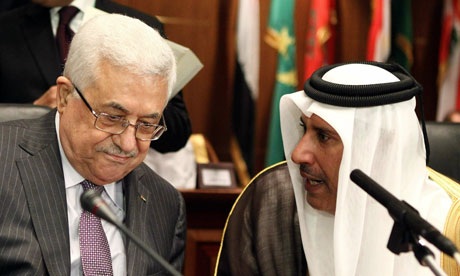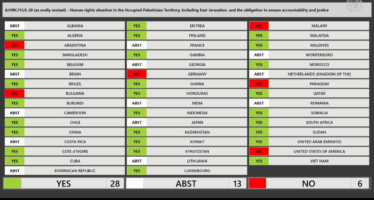Arab League urges US to call halt on Israeli settlements
![]()
Committee has backed the decision of Palestinian president, Mahmoud Abbas, to suspend peace talks with Israel
Ian Black, Middle East editor

Arab foreign ministers have given the US another month to persuade Israel to halt settlement activity in the occupied territories – backing the decision by Palestinian president, Mahmoud Abbas, to suspend peace talks.
Talks in Libya produced a statement by the Arab League last night urging the Obama administration to carry on working for an extension of Israel’s 10-month settlement freeze, which expired last month, so that the already faltering negotiations can continue.
Abbas had urged ministers of the 22-member league to back his call for more time before pronouncing the talks a failure, as many observers predict they eventually will be.Qatar’s foreign minister, Sheikh Hamad bin Jassim al-Thani, who chaired the meeting in the coastal town of Sirte, told reporters: “The committee endorses the decision of President Abbas to stop the talks. It urges the American side to pursue efforts to resume the peace process and put it back on the right track, including stopping settlements.”
The league committee will meet again within one month to study alternatives proposed by Abbas.
The effect of the Arab decision is to allow the quest for negotiations to go into extra time despite what had appeared to be an early and potentially terminal crisis over the ever-intractable settlement issue.
Direct Israeli-Palestinian peace talks were ceremonially relaunched early last month in Washington and just two working sessions were held in Egypt and Jerusalem before the expiry of the settlement moratorium.
The US has urged Israel to extend it, but the prime minister, Binyamin Netanyahu, has refused to do so, arguing that the housing needs of Jewish settlers were simply a matter of “natural growth” and blaming the Palestinians for making an unreasonable demand.
Abbas and other Palestinian officials had made clear they would not be able to carry on negotiating with Israel without an extension of the freeze, even for two or three months.
Palestinians see the presence of 500,000 Israelis in some 120 settlements in the West Bank and East Jerusalem as a threat to the viability of their future state and a freeze as a key test of Israel’s good faith.
Diplomats and analysts say that while both sides are deeply pessimistic about prospects for success, neither wishes to be blamed for the collapse of the peace process. That would be a grave blow to US prestige and risk political chaos and a possible slide into violence on the ground.
“There are no talks at the moment because the position of the Israelis is very, very negative,” said the Arab League’s Egyptian secretary-general, Amr Moussa. “They are not cooperating in the negotiations.”
Abbas’s position was backed by Egypt and Jordan, which both have peace treaties with Israel, as well as Saudi Arabia and most Gulf states, which do not. But Libya and Syria have reservations. Syria’s foreign minister, Walid al-Muallem, conspicuously stated away from the Sirte meeting.
In the West Bank town of Hebron, meanwhile, Israeli troops shot and killed two Palestinians who were described as members of the military wing of Hamas, the Izzedine al-Qassam Brigades. The two were reportedly part of the cell responsible for an attack which killed four Israeli settlers on the eve of the relaunch of the talks.
Related Articles
Turkey presses for Palestinian unity in talks with Abbas
![]()
TODAYSZAMAN Grandsons of Palestinian President Mahmoud Abbas (C) also attended his talks with Turkish Prime Minister Recep Tayyip Erdo?an Prime
Gaza/Israel: conclusión de las audiencias en demanda de Nicaragua contra Alemania
![]()
El pasado 9 de abril, la Corte Internacional de Justicia (CIJ) anunció el final de las audiencias entre Nicaragua y Alemania, con respecto a la solicitud urgente de medidas provisionales
The UNESCO mess
![]()
The Obama Administration says there will be further cutoffs if other UN agencies follow suit in recognising Palestine MJ Rosenberg



